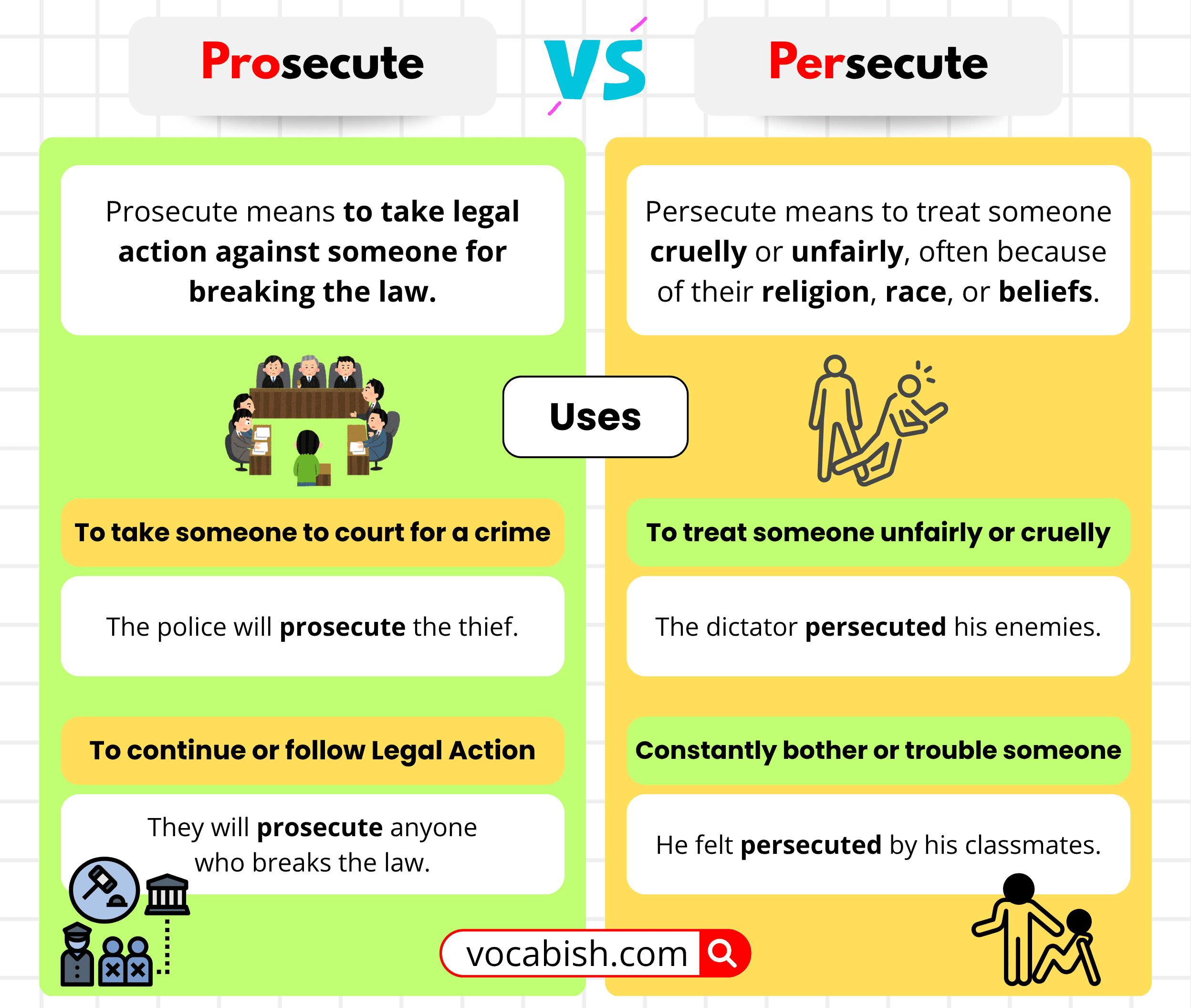In English, words like prosecute and persecute sound similar but have very different meanings. Knowing the difference is important for speaking, writing, reading, and listening accurately. In this blog post, you will learn when to use prosecute and persecute correctly, and see examples that show how each word works in real sentences. By understanding these words, you can master their usage and express your ideas more precisely.
You can explore our 100 confusing words list to expand your vocabulary skills!
Meanings of Prosecute and Persecute
Prosecute
Prosecute means to take legal action against someone for breaking the law. It is used in legal or court-related situations.
Examples:
- The lawyer decided to prosecute the criminal.
- The company will prosecute anyone who steals its data.
Persecute
Persecute means to treat someone cruelly or unfairly, often because of their religion, race, or beliefs. It refers to continuous mistreatment or oppression.
Examples:
- Many people were persecuted for their faith.
- The regime persecuted political opponents harshly.
Differences Between Prosecute and Persecute
| Aspect | Prosecute | Persecute |
|---|---|---|
| Meaning | To take legal action against someone | To mistreat or harass someone continuously |
| Context | Used in legal or court matters | Used in social, political, or religious situations |
| Focus | Law and justice | Cruelty or unfair treatment |
| Example | The state decided to prosecute the thief. | The group was persecuted for their beliefs. |
Usage of Prosecute
1. To take someone to court for a crime:
- The police will prosecute the thief.
- He was prosecuted for stealing money.
2. To continue or follow legal action:
- The lawyer decided to prosecute the case.
- They will prosecute anyone who breaks the law.
Usage of Persecute
1. To treat someone unfairly or cruelly:
- People were persecuted for their beliefs.
- The dictator persecuted his enemies.
2. To constantly bother or trouble someone:
- He felt persecuted by his classmates.
- She was persecuted at work by her boss.
Formal and Informal Usage
| Formality | Prosecute | Persecute |
|---|---|---|
| Formal Use | Common in legal, court, or government contexts. | Common in historical, social, or political discussions. |
| Informal Use | Rarely used in daily speech. | Sometimes used figuratively, e.g., “Don’t persecute me with questions.” |
| Example (Formal) | The authorities will prosecute the suspect under the new law. | Many communities were persecuted for generations. |
| Example (Informal) | He said he would prosecute anyone who copies his idea. | She joked that her teacher persecutes her with homework. |
Example Sentences with Prosecute
- The government decided to prosecute the corrupt official.
- They will prosecute the driver for reckless driving.
- The company plans to prosecute anyone involved in theft.
- The lawyer refused to prosecute without strong evidence.
- The police prosecuted several people for drug crimes.
- He was prosecuted for tax evasion.
- They chose not to prosecute due to lack of proof.
- The court will prosecute the case next week.
- Anyone who damages public property will be prosecuted.
- The bank prosecuted the man for fraud.
- The judge decided to prosecute under the new law.
- The organization prosecuted employees for data theft.
- She was prosecuted for driving without a license.
- The authorities will prosecute those involved in the scam.
- It’s illegal, and you could be prosecuted for it.
- The firm threatened to prosecute anyone misusing its brand.
- He was prosecuted after admitting his crime.
- The police will prosecute all people breaking the curfew.
- The court prosecuted the suspect for murder.
- You could be prosecuted for lying to the police.
Example Sentences with Persecute
- Many people were persecuted for their beliefs.
- The dictator persecuted political opponents.
- The regime persecuted anyone who spoke against it.
- He felt persecuted by his classmates.
- Religious groups were persecuted during the war.
- They were persecuted because of their race.
- The soldiers persecuted innocent villagers.
- History tells of people persecuted for their culture.
- The minority group was persecuted for centuries.
- She felt persecuted at work by her boss.
- Many writers were persecuted for their opinions.
- They were persecuted just for asking for equality.
- His ancestors were persecuted in their homeland.
- The refugees fled after being persecuted.
- He believes he is being persecuted unfairly.
- The community was persecuted under the new law.
- The people were persecuted because of their traditions.
- They were persecuted by the army for protesting.
- The film shows how activists were persecuted.
- She claimed the media persecutes her constantly.
Summary of Persecute vs Prosecute
- Prosecute = To take someone to court for a crime.
- Persecute = To mistreat someone cruelly or unfairly.
- Prosecute relates to law and justice, while persecute relates to suffering or oppression.
- Use prosecute for legal punishment and persecute for unjust treatment.
FAQs on Prosecute and Persecute
What is the difference between prosecute and persecute?
Prosecute means to take legal action against someone, while persecute means to treat someone cruelly or unfairly.
Can prosecute and persecute be used interchangeably?
No. Prosecute relates to law and courts; persecute relates to unfair treatment or abuse.
What part of speech are prosecute and persecute?
Both are verbs.
What is a common mistake with these two words?
Many people use persecute when they actually mean prosecute in legal contexts.
How can I remember the difference?
Think “prosecute = court” and “persecute = cruelty.”
Read More

